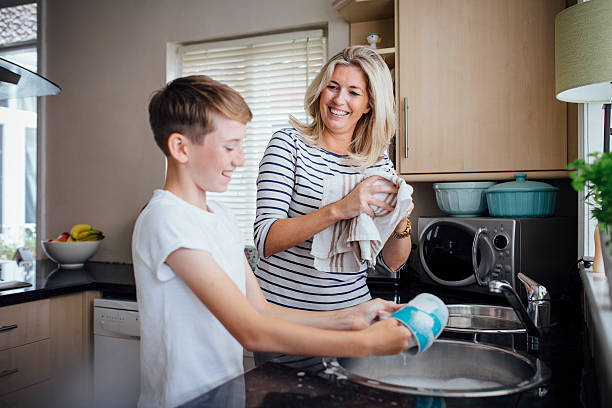Managing a household is a full-time job, especially for parents juggling work, childcare, and personal responsibilities. But what if there were ways to make this task easier and more enjoyable? By incorporating a few clever tricks and involving your kids in household chores, you can transform daily tasks into a fun and educational experience for the whole family. Here’s how you can do it.
1. Create a Family Routine with a Twist
Establishing a routine is key to managing household activities, but adding a little creativity can make it more engaging. Consider setting up a weekly schedule that assigns specific chores to each family member, including your kids. Use colorful charts or apps designed for kids to track their progress. For instance, Monday could be "Tidy Up the Living Room Day," and Thursday could be "Laundry Sorting Day."

Tip: Reward kids with stickers, extra playtime, or a special treat for completing their chores. This not only motivates them but also teaches them responsibility.
2. Turn Chores into Games
Kids love playing games, so why not turn chores into a fun competition? For example, set a timer and challenge your kids to see who can pick up the most toys before the time runs out. You can also create a "Chore Bingo" game, where each square represents a different task. The first one to complete a row wins a small prize.

Tip: Incorporate music into the cleaning routine. Playing their favorite songs can make tidying up more enjoyable and keep them energized.
3. Teach Through Example and Collaboration
Children learn by watching their parents. When you involve them in household chores, work alongside them. Show them how to fold clothes, wash dishes, or vacuum the floor. Not only does this teach them valuable life skills, but it also provides an opportunity for bonding.

Tip: Make chores age-appropriate. Younger kids can handle simple tasks like dusting or sorting laundry, while older kids can take on more responsibility, such as cooking or gardening.
4. Assign Special ‘Grown-Up’ Tasks
Kids love feeling like they’re helping out in a big way. Assign them tasks that make them feel responsible, such as setting the table for dinner, feeding pets, or helping with meal prep. Let them take the lead on these tasks to boost their confidence.

Tip: Encourage creativity by letting your kids plan a meal or design a table setting. This not only involves them in the process but also sparks their imagination.
5. Incorporate Learning Opportunities
Household chores can double as educational activities. For example, cooking can teach kids about measurements, fractions, and healthy eating. Sorting laundry by color can help younger children learn about colors and patterns.

Tip: Use chores to teach teamwork and problem-solving. If a task is too big for one child, encourage them to ask for help from a sibling or parent. This fosters cooperation and communication skills.
6. Celebrate Achievements
When the chores are done, celebrate the family’s hard work. Whether it’s a movie night, a trip to the park, or a homemade treat, acknowledging everyone’s efforts makes the experience positive and rewarding.

Tip: Reflect on the week’s accomplishments during a family meeting. Discuss what went well and how everyone can improve. This keeps everyone motivated and involved.
